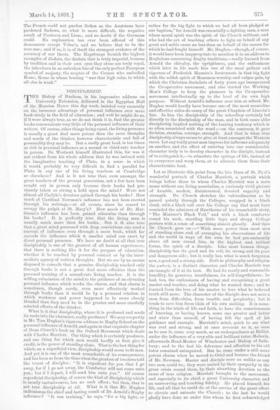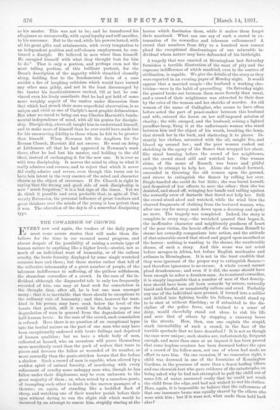DISCIPLESHIP.
THE Bishop of Durham, in his impressive address on University Extension, delivered in the Egyptian Hall of the Mansion House this day week, insisted very earnestly on the immense advantage of personal influence over mere book-study in the field of education ; and well he might do so, if it were always true, as we do not think it is, that the greater books communicate very little of the personal influence of their writers. Of course, other things being equal, the living presence is usually a great deal more potent than the mere thoughts and words of the thinker, however characteristic and full of personality they may be. But a really great book is ten times as rich in personal influence as a second or third-rate teacher in person. Dr. Westcat himself illustrated this, for was it not evident from his whole address that he was imbued with the imaginative teaching of Plato, in a • sense in which it would probably be very difficult to find a parallel for Plato in any one of his living teachers at Cambridge or elsewhere P And is it not true that, even amongst the great teachers of the present generation, not a few have been sought out in person only because their books had pre- viously taken so strong a bold upon the mind ? Were not almost all Carlyle's devotees gained through his books ? How much of Cardinal Newman's influence has not been exerted through his writings,—at all events, since he ceased to occupy- the pulpit at St. Mary's P How much of Dr. Mar- tineau's influence has been gained otherwise than through his books? It is perfectly true that the living man is usually much more than his books. But it Hi also true that a great mind possessed with deep convictions can send a current of influence even tb rough a mere book, which far exceeds the influence which a smaller mind can exert by direct personal presence. We have no doubt at all that true discipleship is one of the greatest of all human experiences ; that there is nothing like it for the purpose of education, whether it be reached by personal contact or by the inter- mediate agency of written thoughts. But we are by no means disposed to concede that a genuine discipleship reached only through books is not a great deal more effective than the personal training of a second-rate living teacher. It is the willing submission of the mind to the guidance of an elevating personal influence which works the charm, and that charm is sometimes, though rarely, even more effectively worked through books than it would be by a personal relation in which weakness and power happened to be more closely blended than they need be in the greater and more carefully selected efforts of the thinker.
What is it that discipleship, where it is profound and sends its roots into the character, really produces P We may see partly in Mr. Tom Hughes's vigorous address to Rugby School on the personal influence of Arnold, and again in that exquisite chapter of Dean Church's book on the Oxford Movement which deals with Charles Marriott. One thing which it certainly produces, and one thing for which men would hardly at first give it credit, is the power of standing alone. That is the last thing for which, on a superficial view, discipleship would seem to fit men. And yet it is one of the most remarkable of its consequences, and has been so from the time when the greatest of teachers told the truest of disciples : "It is expedient for you that I go away, for if I go not away, the Comforter will not come unto you; but if I depart, I will send him unto you." Of course superficial discipleship, of course the kind of discipleship which is mostly imitativeness, has no such effect; but then, that is not true discipleship at all. What is it that Mr. Huglws indicates as the chief and lasting result of Dr. Arnold's Rugby influence P " It was training," he says, "for a big fight, or rather for the big fight to which we had all been pledged at our baptism," for Arnold was essentially a fighting man, a man whose moral spirit was the spirit of the Church militant, and who had the art of teaching others to fight on behalf of any great and noble cause no less than on behalf of the causes for which he had fought himself. Mr. Hughes,—though, of course, it would have been inappropriate to mention it in an address to Rugbeians concerning Rugby traditions,—really learned from Arnold the chivalry, the uprightness, and the enthusiasm which later in life made him one of the most gallant and vigorous of Frederick Maurice's lieutenants in that big fight with the selfish spirit of Mammon-worship and vulgar gain, by which the Christian Socialists of forty years ago inaugurated the Co-operative movement, and also started the Working Men's College to keep the pioneers in the Co-operative movement intellectually up to the level of its own high purpose. Without Arnold's influence over him at school, Mr. Hughes would hardly have become one of the most masculine and effective aides-de-camp of the great Chaplain of Lincoln's Inn. In him the discipleship of the schoolboy certainly led directly to the discipleship of the man, and in both cases alike discipleship implied nothing of • the leaning tendency which is so often associated with the word ;—on the contrary, it gave decision, stamina, courage, strength. And that is what true discipleship always seems to give, at least amongst the Western races. Let any really great man impress his influence adequately on another, and the effect of entering into one considerable character truly is to develop character in the disciple, instead of to extinguish it,—to stimulate the springs of life, instead of to overpower and warp them, or to alienate them from their characteristic bent.
Let us illustrate this point from the late Dean of St. Pall's wonderful portrait of Charles Marriott, a portrait which brings before those to whom Charles Marriott was a mere name without one living association, a curiously vivid picture of humble, modest, disinterested, devoted sagacity and strength. Dr. Church sketches the valetudinarian as he passed quietly through the Colleges, wrapped in a black cloak, with a black veil over his College cap that must have reminded the admirers of Hawthorne of his remarkable story, " The Minister's Black Veil," and with a black comforter round his neck, startling little boys and sleepy College porters with a sense of something almost ghostly. And then Dr. Church goes on :—" With more power than most men of standing alone and of arranging his observations of life and the world in ways of his own, he had pre-eminently above all men round him, in the highest and noblest forms, the spirit of a disciple. Like most human things, discipleship has its good and its evil, its strong and its poor and dangerous side ; but it really has, what is much forgotten now, a good and a strong side. Both in philosophy and religion the sszasra); is a distinct character, and Charles Marriott was an example of it at its best. He had its manly and reasonable humility, its generous trustfulness, its self-forgetfulness ; he had, too, the enthusiasm of having and recognising a great master and teacher, and doing what he wanted done ; and he learned from the love of his master to love what he believed truth still more. The character of the disciple does not save a man from difficulties, from trouble and perplexity; but it tends to save him from idols of his own making. It is some- thing in the trials of life and faith, to have the consciousness of knowing, or having known, some one greater and better and wiser than oneself, of having felt the spell of his guidance and example. Marriott's mind, quick to see what was real and strong, and at once reverent to it, as soon as he saw it, came very much, as an undergraduate at Balliol, under the influence of a very able and brilliant tutor, Moberly, afterwards Head-Master of Winchester and Bishop of Salis- bury; and to the last his deference and affection to his old tutor remained unimpaired. But he came under a still more potent charm when ho moved to Oriel and became the friend of Mr. Newman. Master and disciple were as unlike as any two men could be; they were united by their sympathy in the great crisis round them, by their absorbing devotion to the cause of true religion. Marriott brought to the movement, and especially to its chief, a great University character, and an unswerving and touching fidelity. He placed himself, his life, and all that be could do, at the service of the great effort to elevate and animate the Church ; to the last he would gladly have done so under him whom he first acknowledged as his master. This was not to be; and he transferred his allegiance as unreservedly, with equal loyalty and self-sacrifice, to his successor. But to the end, while his powers lasted, with all his great gifts and attainments, with every temptation to an independent position and self-chosen employment, he con- tinned a disciple. He believed in men wiser than himself. He occupied himself with what they thought best for him to do." That is only a portion, and perhaps even not the most telling portion, of this brilliant portrait, for the Dean's description of the sagacity which stumbled clumsily along, holding fast to the fundamental facts of a case amidst a fire of laughing criticism which would have turned any other man giddy, and not in the least discouraged by the banter his inarticulateness excited, till at last he con- vinced even his lively assailants that he had got hold of some more weighty aspect of the matter under discussion than that which had struck their more superficial observation, is as unique and vivid as one of Carlyle's most graphic delineations. But what we cared to bring out was Charles Marriott's funda- mental independence of mind, with all his genius for disciple- ship. Discipleship, above all, taught him to understand himself, and to make more of himself than he ever could have made but for his unswerving fidelity to those whom he felt to be greater than himself. When Newman left the Anglican for the Roman Church, Marriott did not swerve. He went on doing at Littlemore all that he had approved in Newman's work there, after he had lost his master, and holding to the old ideal, instead of exchanging it for the new one. It is ever so with true discipleship. It nerves the mind to cling to what it really admires and reveres, and to reject that which it never did really admire and revere, even though this turns out to have lain latent in the very essence of the mind and character chosen as the object of reverence. If Dr. Church is right in saying that the strong and good side of such discipleship is now " much forgotten," it is a bad sign of the times. Yet we do think it possible and even probable that, in spite of Uni- versity Extension, the personal influence of great teachers and great thinkers over the minds of the young is less potent than it was. The education of the day is of a somewhat dissipating type.



































 Previous page
Previous page